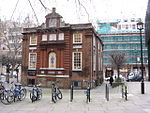Acas
The Advisory, Conciliation and Arbitration Service (Acas) is a Crown non-departmental public body of the Government of the United Kingdom. Its purpose is to improve organisations and working life through the promotion and facilitation of strong industrial relations practice. Acas provides employment law and employment relations advice for employers and employees through its website and helpline. It also offers dispute resolution services such as arbitration or mediation, although the service is perhaps best known for its collective conciliation function – that is resolving disputes between groups of employees or workers, often represented by a trade union, and their employers. Acas is an independent and impartial organisation that does not side with a particular party, but rather will help the parties to reach suitable resolutions in a dispute. Today, the employment world has mostly moved away from large-scale industrial disputes that characterised the late 1970s to the mid-1980s, when Acas became a household name. Accordingly, Acas' emphasis has shifted towards helping businesses to prevent problems before they arise, by means of, for example, its telephone helpline and training sessions. Furthermore, much of Acas conciliation work is now focused on individual complaints to an employment tribunal (i.e. where individuals claim their employer has denied them a legal right).
Excerpt from the Wikipedia article Acas (License: CC BY-SA 3.0, Authors).Acas
Victoria Street, London Victoria
Geographical coordinates (GPS) Address Nearby Places Show on map
Geographical coordinates (GPS)
| Latitude | Longitude |
|---|---|
| N 51.497778 ° | E -0.135 ° |
Address
Windsor House
Victoria Street 42-50
SW1H 0TL London, Victoria
England, United Kingdom
Open on Google Maps









